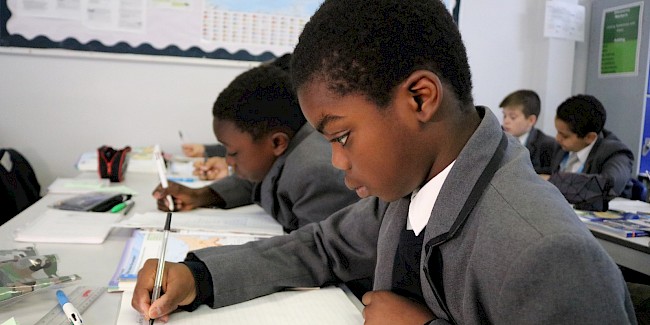Key Stage 4
Students could choose one or both of the languages that they have studied at Key Stage 3. A growing number of able linguists are choosing both because, as we use the same examination board for each, students find that it can be a huge help to follow both courses simultaneously.
The study of a foreign language is also necessary for pupils who wish to achieve an EBacc. Universities view languages favourably and employers value a CV that shows achievement in MFL (Modern Foreign Languages).
Course Title: GCSE French
Examination Board: EDEXCEL
Examination Details:100% external assessment- all papers to be set and marked by Edexcel.
Listening: 25% of overall mark
Students will be expected to understand a series of extracts and conversations in French, spoken clearly and comparatively slowly. At least 20% of all instructions will be in French. Answers will be mainly non-verbal.
Speaking: 25% of overall mark. Speaking will comprise of 3 components:
- Task 1 – a role play based on one topic.
- Task 2 – questions based on a picture stimulus based on one topic that is allocated by Pearson.
- Task 3 – conversation based on two themes. The first theme is based on the topic chosen by the student in advance of the assessment. The second theme is allocated by Edexcel (previously studied in class).
Reading: 25% of overall mark.
- At least 30% of the questions will be in French.
- Students will be expected to read a variety of stimuli including a short literary piece.
- 1 translation from French into English.
Writing: 25% of overall mark
- Students will be expected to complete a variety of tasks including 1 translation (English-French) which will be in sentences or short passages depending on the tier.
- In order to achieve a grade 5-9 at GCSE, students must be able to use a variety of grammatical structures including the past, present and future tenses and be able to express and justify opinions.
Course Outline
The course covers a variety of contexts linked to themes that relate to:
- Identity and culture
- Local, national, international and global areas of interest
- Current and future study and employment
- There will be an emphasis on the culture and identities of the French speaking countries and communities.
- Students will also be exposed to literary texts, adapted as required.
- There will be a focus on independent and spontaneous use of French.
An understanding of French-speaking life and culture forms an integral part of this course and it is hoped that students will visit a French speaking country either on holiday or on a school journey. There will be residential trips (in the last two years, we went to Warsy and Normandy where we visited the Mont St Michael and the Bayeux tapestry)
Cross-Curricular Links
The French course will appeal to pupils who:
- Have an interest in the French language
- Are interested in finding out about another culture
- Have a sense of adventure by taking part in visits
- Are considering working in a French-speaking country
Furthermore, the course encourages a greater appreciation of French language, as well as a greater understanding of language in general. It would therefore be of great benefit to English Language and Literature students.
French also has wider links with Life Skills:
Health & wellbeing:
- Personal information, greetings, how are you?
- Healthy eating- food and drink.
- Sport and sport habits, free time activities.
- Drugs, alcohol and consequences (Year 11).
- New technologies. Advantages and disadvantages of social networks, apps, video games.
- Issues in school-exam stress/bullying. -Media and social media. Role models (Y9/Y10)
- Relationships: Marriage, single sex families, same sex -Issues in school-exam stress/bullying. -Media and social media.
- Living in the wider world (Careers)
- World of work, importance of languages on helping to find a job. Studying and working abroad.
- Writing a CV, applying for jobs and writing a covering letter.
- Different customs and festivals – tolerance.
Students with a grade 6 or above will have achieved a firm foundation to study French at KS5.
The acquisition of a good A Level grade would allow you to pursue French and possibly other languages at university and would be a considerable advantage in the world of employment. Please do not overlook the possibility of studying abroad too!
The ability to speak other languages opens up countless opportunities in both the fields of leisure and work. There will be a shortage of qualified linguists and your services will be in great demand by industry if Britain is to compete in a business context on a global level. The course encourages a greater appreciation of French language, society and culture, as well as a greater understanding of language in general. It would therefore be of great benefit to English Language and Literature students.
Year 10
| Term 1 | Term 2 | Term 3 | Term 4 | Term 5 | Term 6 |
|---|
- Interests and influences.
- Recap present, preterite and future.
- Reading exam technique.
- LOVE MFL-Linking words, Opinions and reasons, Very accurate, Exciting vocabulary, Mixture of tenses, Full descriptions and A-level phrases.
- Cultural opportunities.
- Speaking exam technique- photo card/conversation.
- Recap terms 1-3-retrieval activities.
| - Holidays in the present and past.
- Present tense and preterite tense.
- Cultural opportunities.
- LOVE MFL- focus on Linking words/Opinions and reasons.
- Listening exam technique.
- Speaking exam technique-role play/conversation.
- Writing exam technique- translation of bullet points/40-50 words writing task.
| - Town and places.
- Present tense
- Recap Year 9
- Cultural opportunities.
- LOVE MFL
- Mastering the 80-90 words writing task/ translations.
- Introducing the 130-150 words task- bullet points and more complex phrases.
- Speaking exam technique- role play/photo card/conversation.
| - School in the present and in the past.
- Speaking exam technique- photocard/conversation.
- Future (Immediate and simple)
- LOVE MFL-focus on Mixture of tenses/Exciting vocabulary/Full descriptions.
- Cultural opportunities.
- Writing exam technique- 80-90 words task.
- Recap of term 1- retrieval activities.
| - Towns and shopping
- Recap 3 tenses
- Assessment technique
- Past paper technique
- Understanding the GCSE requirements
- LOVE MFL (as previous term)
- Cultural opportunities.
- Speaking exam technique- photo card/conversation.
- Recap terms 1-4-retrieval activities.
| - Food and customs
- Speaking and writing technique
- Preterite vs imperfect
- LOVE MFL
- Cultural opportunities.
- Recap of term 1
- Writing technique-80-90 words vs 130-150 words task.
- Speaking exam technique- role play/presentation/conversation.
- Translations TL to English.
|
Year 11
| Term 1 | Term 2 | Term 3 | Term 4 | Term 5 | Term 6 |
|---|
- Future aspirations and work.
- Simple future/immediate future/conditional
- LOVE MFL
- Cultural opportunities.
- Recap Y10/ 11
- Writing technique-130-150 words task.
- Speaking exam technique-phtocard/presentation/conversation.
- Listening and reading exam technique.
- Translations English to TL.
| - International and global dimension.
- Subjunctive
- LOVE MFL
- Cultural opportunities.
- Recap terms 1-4.
- Writing technique-80-90 and 130-150 task.
- Speaking exam technique- role play/presentation/conversation.
- Translations TL to English and English to TL.
- Listening and reading exam technique.
| - Listening and reading exam technique.
- Speaking and writing exam technique.
- LOVE MFL
- Cultural opportunities.
- Writing technique-130-150 words task.
- Speaking exam technique- photo card/presentation/conversation.
- Translations TL to English and English to TL.
- Recap on holidays and school.
- Present/past/future
- Recap Y10
| - Grammar Recap
- Complex structures embedding
- Literary texts introduced.
- Extended cultural opportunities.
- LOVE MFL (as previous terms)
- Speaking exam technique- role play/photo card/conversation.
- Mastering the 80-90 words writing task/ translations.
- Retrieval activities.
- Recap on identity and culture.
- Imperfect
- Interests and influences.
| - Grammar Recap
- Complex structures embedding
- Literary texts introduced.
- Extended cultural opportunities.
- LOVE MFL (as previous terms)
- Speaking exam technique- role play/photo card/conversation.
- Mastering the 80-90 words writing task/ translations.
- Retrieval activities.
- Recap on identity and culture.
- Imperfect
- Interests and influences
| GCSEs |
Please see below KS5 for Learning Journey.

 consolidate knowledge of vocabulary and grammar terms and structures and they will be building on the previous knowledge acquired throughout KS3 and KS4. New knowledge is acquired and consolidated on a variety of topics. Students will be monitored and targeted regularly through cyclical assessments and meta-memory AFL, questioning etc. Students will be fully aware of the requirements for the GCSE exam and with exam skills that will help them with the GCSE outcomes. Students will acquire some transferable knowledge and skills that can be used and developed further at A Level and real-life situations.
consolidate knowledge of vocabulary and grammar terms and structures and they will be building on the previous knowledge acquired throughout KS3 and KS4. New knowledge is acquired and consolidated on a variety of topics. Students will be monitored and targeted regularly through cyclical assessments and meta-memory AFL, questioning etc. Students will be fully aware of the requirements for the GCSE exam and with exam skills that will help them with the GCSE outcomes. Students will acquire some transferable knowledge and skills that can be used and developed further at A Level and real-life situations.

